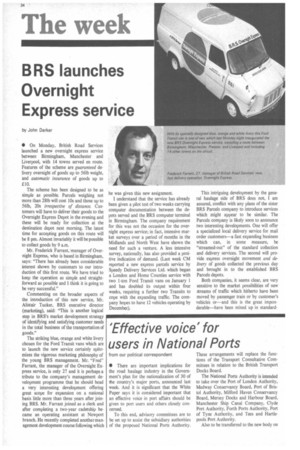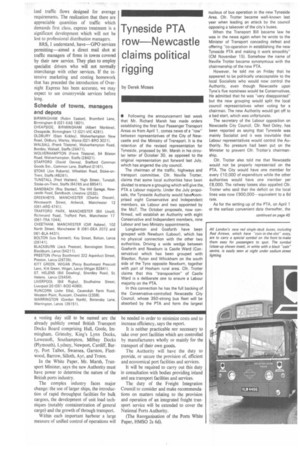'Effective voice' for users in National Ports
Page 36

Page 37

If you've noticed an error in this article please click here to report it so we can fix it.
from our political correspondent • There are important implications for the road haulage industry in the Government's plan for the nationalization of 30 of the country's major ports, announced last week. And it is significant that the White Paper says it is considered important that an effective voice in port affairs should be given to port users and others closely concerned.
To this end, advisory committees are to be set up to assist the subsidiary authorities of the proposed National Ports Authority. These arrangements will replace the functions of the Transport Consultative Committees in relation to the British Transport Docks Board.
The National Ports Authority is intended to take over the Port of London Authority, Medway Conservancy Board, Port of Bristol Authority, Milford Haven Conservancy Board, Mersey Docks and Harbour Board, Manchester Ship Canal Company, Clyde Port Authority, Forth Ports Authority, Port of Tyne Authority, and Tees and Hartlepools Port Authority.
Also to be transferred to the new body on
a vesting day. still to be named are the already publicly owned British Transport Docks Board comprising Hull, Goole, Immingham. Grimsby, King's Lynn Docks, Lowestoft, Southampton, Milbay Docks (Plymouth), Lydney, Newport, Cardiff, Barry, Port Talbot, Swansea, Garston, Fleetwood, Barrow, Silloth, Ayr, and Troon.
In the White Paper, Mr. Marsh, Transport Minister, says the new Authority must have power to determine the nature of the British ports industry.
The complex industry faces major change: the use of larger ships, the introduction of rapid throughput facilities for bulk cargoes, the development of unit load techniques (notably containerization of general cargo) and the growth of through transport.
Within each important harbour a large measure of unified control of operations will be needed in order to minimize costs and to increase efficiency, says the report.
It is neither practicable nor necessary to take over port facilities which are controlled by manufacturers wholly or mainly for the transport of their own goods.
The Authority will have the duty to provide, or secure the provision of, efficient and economical port facilities and services.
It will be required to carry out this duty in consultation with bodies providing inland and sea transport facilities and services.
The duty of the Freight Integration Council to consider and make recommendations on matters relating to the provision and operation of an integrated freight transport service will be extended to cover the National Ports Authority.
(The Reorganisation of the Ports White Paper, HMSO 2s 6d).












































































































































































